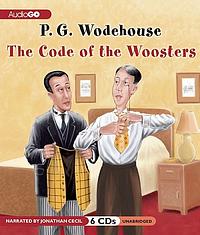Take a photo of a barcode or cover
This book made me laugh harder than anything has in a long time! I heartily recommend it for anyone looking for a clever and entertaining read.
This is a delightful romp of a book. I am pretty sure the best word to describe this book is fun. The plot constantly twists and turns always to the disadvantage of Bertrand who relies on his man Jeeves to help turn the tables. Wodehouse wrote something like 96 books which leaves me with only 94 more to read. I can't wait for the next Jeeves adventure.
one of the best Wooster books. Some of the best quotes too.
I have never laughed out loud so often reading a book! Wodehouse is a genius.
How do you select an exemplar of so many Wodehouse books that you've read? Wodehouse was more than just Jeeves, but Jeeves and Wooster are the characters by which he is usually remembered, so I selected from that series. Within that series, I want to start by reviewing The Code of the Woosters, because it shows maturity in the series, and includes contemporary politics. Wodehouse is often accused of writing of such farcical worlds that they have no relevance or meaning. This is nonsense: his general satire was of contemporary upper middle class British society, and extended to Hollywood. Interestingly, for a man who was accused of Nazi sympathies during World War II, when he appeared on German radio, to his self-admitted regret, his novels were clearly anti-fascist before World War II. This makes sense given his conservative pre-emptive nostalgia for the British civilization that was already slipping away. He was not a radical: British fascists were dissatisfied with conservatism and democracy. Wodehouse was not dissatisfied with his society, and he celebrated its eccentricites, even though he was appropriately critical of the ridiculous extremes. That is where fascism came into this particular novel. It features a new fictional character named Roderick Spode, 7th Earl of Sidcup, as leader of the fictional “Saviours of Britain” or “black shorts” - a corruption of "black shirts," the most colloquial manifestation of the British Fascists, formed by Oswald Mosley. Mosley was a hereditary aristocrat unwilling to give up his privileges to be consistent with his radical socialism. Wodehouse captures these inconsistencies in Sidcup, satirically, but doesn't shy from portraying the menace, the tempestuousness, and the misogyny. This is satire that is both hilarious and serious at the same time, a rare achievement.
(i think i gave up trying to read them in order. but nevermind.)
holy shit. this has to be my favourite j&w so far.
'There are moments, Jeeves, when one asks oneself, 'Do trousers matter?
'The mood will pass, sir.'
this was sort of like reading a mystery novel, except that there are no murders, just missing cow-creamers and policemen's helmets being thrown out of windows.
10/10 would eat with rice
holy shit. this has to be my favourite j&w so far.
'There are moments, Jeeves, when one asks oneself, 'Do trousers matter?
'The mood will pass, sir.'
this was sort of like reading a mystery novel, except that there are no murders, just missing cow-creamers and policemen's helmets being thrown out of windows.
10/10 would eat with rice
funny
lighthearted
relaxing
slow-paced
Plot or Character Driven:
A mix
Strong character development:
No
Loveable characters:
Complicated
Typical Wodehouse silliness, intended and implicit social commentary and lots of comical allusions to great literature, history and scripture.

